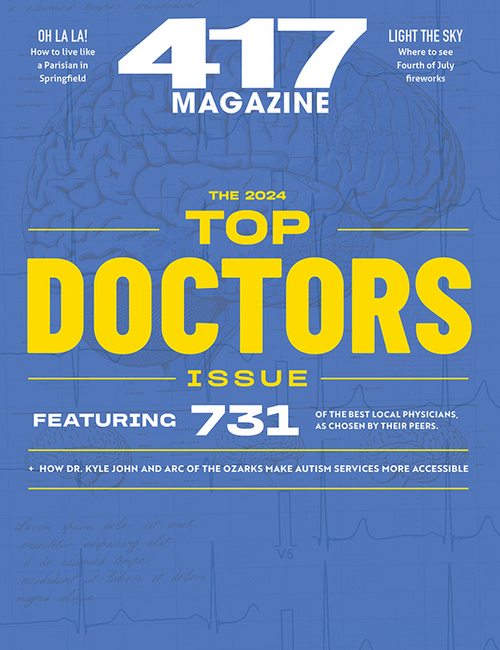We Are #417Strong
Your Mental Health and COVID-19
How do you keep your cool during a global health crisis? It's important to take care of your mental health.
By Jamie Thomas
Mar 26 2020 at 4 p.m.

You’d be forgiven for feeling stressed, anxious or depressed in the midst of the current global health crisis. Now, possibly more than ever, it’s important to look after your mental health. Here are some tips and resources for staying grounded while you’re social distancing. This blog is just intended as general advice and shouldn't be taken as medical guidance. If you feel you need to speak to a professional, head over to Burrell Behavioral Health.
Recognize Your Mental Health Symptoms
Understanding your own behavior can help you recognize when something is wrong. If you notice significant changes in your mood or what you’re doing day-to-day (or if someone close to you that you trust notices the same thing), it’s a good idea to speak to someone. According to Burrell Behavioral Health, key changes to be aware of include:
• Generalized worry or fear
• Difficulties with attention or concentration
• Intermittent bouts of moodiness
• Disturbances in sleep (too little or much more than usual)
• Increased physical complaints or worsening of chronic health issues
• Increased desire to misuse substances (for example alcohol, drugs or even certain prescription medications).
These aren’t necessarily symptoms of mental illness, but can still be difficult to deal with and potentially lead to long term issues. It’s always worth asking for help.
Practice Self-Care
Self-care is important for your body and your brain. Eating well, exercising, spending some time outside, meditating, or even doing chores while you listen to music or podcasts—all of these count as self-care if they help you feel good.
Make Downtime Productive
Have something you always wanted to work on but never had the time? Whatever it is, now could be your chance to get started. It could be writing a book, homemade crafts, rearranging your furniture or even just watching classic movies you’ve never seen. This is especially helpful if you’re not working. A lack of routine can severely impact your mental health, so organize your day. Give yourself tasks and to-do lists and establish your own workday, no matter what it is you're getting done.
Stay Grounded
Although there aren’t any quick-fixes when it comes to your mental health, there are some things you can do to stop yourself getting overwhelmed. “Grounding” is a way to bring yourself back down to earth when your anxiety gets too much. Here’s a technique that could help:
Sit somewhere comfortable and take some deep breaths
5. Look around and identify five things around you that can see
4. Listen for four things in your environment that you can hear
3. Without getting up, reach for three things around you that you can physically touch
2. Try and identify two things that you can smell
1. Identify one thing you can taste.
Unplug from the News
Our 24-hour news cycle and instant-update culture is unhealthy enough as it is, but at the moment it can feel outright apocalyptic. Now is a better time than ever to try and disconnect from the news and reconnect to your life. Limit yourself to 15–30 minutes of news updates a day—if something really important happens, you’ll find out either way. A personal recommendation here is to check at the beginning of the day, that way you’re not dreading an evening catch-up. For relevant local updates, check the Springfield Greene-County Health Department website or the Springfield News-Leader; use the CDC’s website for national updates and the WHO’s official website if you want to see what’s happening internationally.
Now might also be a good time to practice some social-media distancing. Social media can be great for connecting with people, but it is not great for news. It’s very easy for people to post whatever misinformation they want to a newsfeed and it’s all too easy to believe it. When you get your daily news update, make sure it’s from a real source and not someone looking for likes or just a reaction.
Keep Talking
As of March 26, 417-land is under a stay-at-home order to encourage social distancing. But social distancing doesn’t mean have to mean social isolation (in fact, Matt Lemmon, System Director of Communications at Burrell told us they prefer to call it “physical distancing.”) Social isolation will make anxiety and depression worse, so it's important you stay in touch with people. This is where social media can be useful: virtual meetings for those working from home, virtual hangouts on the weekends, video calls (or just regular ones) with relatives or friends you might not be able to visit right now—socializing is still possible thanks to how connected we all are. Even if it's just an emoji-filled chat group, every little connection will help.
Reach Out to a Professional
If you’re concerned about your mental health, the best thing you can do is reach out to a professional. Burrell Behavioral Health is offering a free digital platform providing some quick help (this isn’t a substitute for counseling or therapy sessions and is only meant as a supplementary service), along with a 24-hour phone line for help with your immediate situation: 1-800-494-7355. As of March 24, Burrell is also able to accept tele-intakes and tele-assessments for anyone who is not a patient with them. You can also find some useful self-care information on their regular Facebook Live events. Eustasis Psychiatric and Addiction Health is offering walk-ins for people suffering anxiety related to the COVID-19 pandemic. You can find a full list of local mental health resources at the Springfield Greene-County Health Department’s website. Synergy Counseling Services are currently offering telehealth services for a reduced rate for self-paying clients or depending on individual insurance policies. Visit the website or call 417-351-4282 for more.
For general health concerns, CoxHealth and Mercy are offering virtual visits (keep in mind they have high volumes of inquiries at the moment).
Remember that this blog is just general advice. If you feel like these feelings are unmanageable or out of your control, get in touch with one of the services listed above or visit the Burrell Behavioral Health website to speak to a professional. Remember, too, that this is a global situation—we really are all in this together. You’re not alone in feeling worried or down, and neither are you wrong for feeling that way. We’ll be here with you, ready to emerge stronger on the other side. In the meantime, help us stay #417strong and let us know how else we can help.











